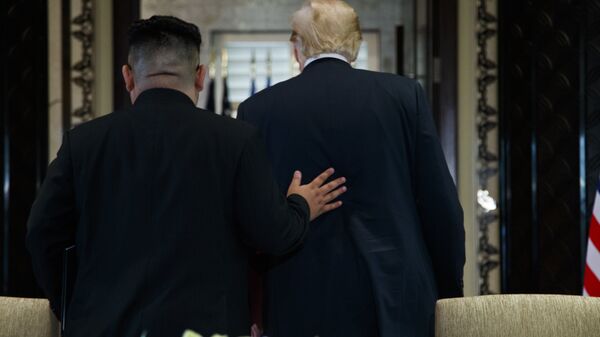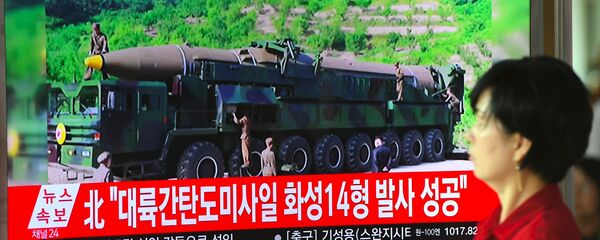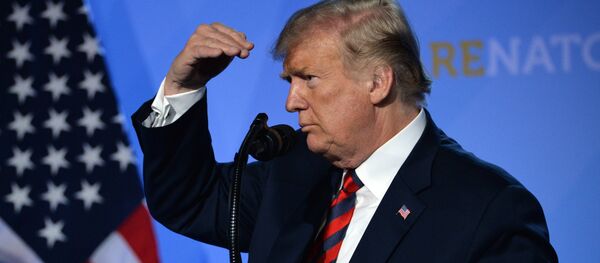Sputnik: What could be expected from Washington and Pyongyang now, considering the latest calls from the US to maintain sanctions against the North? How achievable is a breakthrough?
Alexander Azadgan: More mafia diplomacy from President Trump, more arm twisting, more threats, more erratic behaviour, saying one thing on one occasion, then saying the exact opposite on another occasion. It’s more of what I call the Bob Haldeman’s, who was a senior advisor, chief of staff to President Nixon, “madman theory,” which basically is the crazier you sound, the more erratic you sound the more you're going to confuse your counterpart. This is what you’re supposed to expect from this president and, honestly, if you expect anything more and you’re hoping for anything more, then it would be delusional. This man has unravelled and declared his foreign policy right from the beginning, which was disastrous and he’s acting accordingly. His behaviour, his policy has been one of the easiest forecasts of my life; everything that we were forecasting a year before he ran for office matches, he’s manifesting it. Whether it’s with Iran or with Russia, definitely with China, for sure with North Korea and other parts of the world that want to sort of have an independent foreign policy. The US is engaged in this mindless concept of exporting perpetual war, chaos and anarchy. In West Asia they’ve been quite successful, Washington created ISIS, look at what’s happening in Syria; Libya is a disaster practically ruled by war lords and Al Qaeda. While Japan has been showing reconciliatory efforts towards this week’s ASEAN meeting that just happened, because they don’t want the region to be turned into a chaotic place, they don’t want the North Korean excuse to be blown out of proportion, and to use the North Korean leader as a scarecrow in order to have more domination there, to divide and conquer.
Alexander Azadgan: To woo people away from China, most people forget that President Obama’s Trans-Pacific Partnership was very much intent to isolate China. It's very interesting that Mr. Trump came into office and focused only on the job element of it but not the geopolitical aspects of this, and now all of a sudden as a result of it TTP is no longer in effect and China, even though it’s acting sometimes hegemonically, they see the whole area as their backyard, whether it's the South China Sea, Taiwan, East China Sea and even, believe it or not, the Philippine Sea, they see most [of these] places as their sphere of influence, as their backyard, more or less.
Sputnik: Now the US military has also received an order to report on China’s military activity in the South China Sea. What do you make of this order and what reaction can we expect from Beijing?
Alexander Azadgan: More high-seas skirmishes that perhaps may never make it to news. The Chinese are sort of increasing their rhetoric when it comes to Taiwan, they see it as a renegade province but then again look again at the US, it's halfway around the world and they're trying to tell the Chinese what to do with what they feel is a renegade province, of course, it’s not that simple. Most people forget that President Obama had an Obama doctrine, and one of the things he wanted to do was to take the emphasis away from West Asia, the so-called Middle East; take that away and, perhaps, that was the point, perhaps to have the biggest military base in Australia, in North Australia, to keep an eye on China, and China is not happy with that at all. I think sometimes in America we forget that other countries have caught up to [the] US and it’s not 1946, when you had a leverage and an edge over everybody else, because everybody else was bombarded, you now, the industrial base was decimated. Countries are catching up, the militaries are catching up, new alliances are taking place. Let’s not forget the $400 billion oil deal that was signed between Russia and China not too long ago, a few years ago, in each other‘s currencies, not in dollars. Washington is feeling very threatened, but at the same time it thinks if it acts hegemonically that it would be the solution. I think Washington needs acknowledge that we’re moving faster and faster to a multipolar world instead of the unipolar arrangements since the fall of the Soviet Union in 1991. So they're trying to create a policy, the good old British policy of to divide and conquer, extending lucrative trade deals to countries that are somewhat cooperating with China right now out of desperation, I should say, and to keep the threat alive, at least in the perception of the global masses that North Korea is suicidal, that it’s going to do something crazy, whereas all along it is [the US] that is acting erratically and completely illogically.
Alexander Azadgan: War and anarchy in the region is not to their economic advantage, that’s why the Chinese overall geopolitical policy is reconciliation and a way to a solution. Anything to slow down their economic growth would be a clear and present danger to China in terms of its own inner politics and its restless young population who is in touch with the rest of the world and no longer abides by the good old-fashioned values of the members of the Communist party. In order for China to have prosperity, they need to make sure that treaties, alliances, free trade, all of the rules of the WTO that serve them, stay in place so that they can have domestic control over their population.
The views expressed in this article are those of the speaker, and do not necessarily reflect those of Sputnik.





